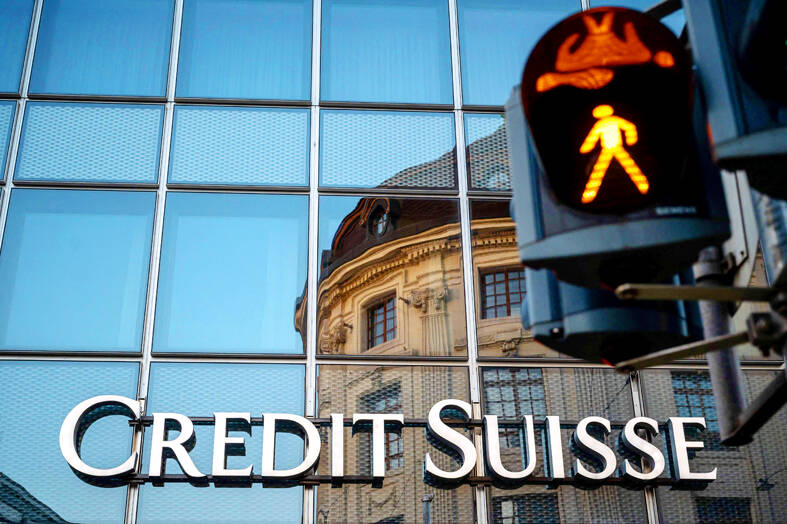Credit Suisse Group AG reported 61.2 billion Swiss francs (US$68.7 billion) of outflows in the first quarter and took a large writedown at its wealth management unit, underscoring the challenge for UBS Group AG in retaining key clients and assets after the emergency takeover.
The Swiss lender reported SF47.1 billion of net outflows in wealth management, traditionally the most prized business, and said that a SF1.3 billion impairment charge was mostly related to that unit.
The bank raised its profit warning for the business, saying it expects a “substantial” loss for the group as a whole this year.

Photo: AFP
Wealthy clients and retail depositors pulled billions of Swiss francs from Credit Suisse over several frantic days last month after its anchor Saudi shareholder said that it would not invest more in the company.
That was the second crisis of confidence in the bank within months, and one that led the Swiss government to broker a rescue by its largest rival on fears that Credit Suisse would fall into bankruptcy.
The scale of the outflows and losses highlight the risks for UBS in an integration that the bank has said could take up to four years and be more difficult to conduct than many of the bank takeovers executed during the 2008 crisis.
While Credit Suisse said that outflows have moderated and not reversed, it also lost about SF6.9 billion of outflow at the Swiss unit, mostly in private client business, and a further SF11.6 billion in asset management.
The bank reported a pretax profit of SF12.8 million for the first quarter, boosted by the write-down to zero of SF15 billion of additional tier 1 capital notes as part of UBS’ acquisition of Credit Suisse. That move proved hugely contentious, with many investors exploring legal options even after the Swiss government maintained the move was within its rights under the securities’ contract. Without the adjustment, Credit Suisse posted a loss of SF1.3 billion for the quarter.
Credit Suisse began its latest restructuring in October last year, including as many as 9,000 job cuts, as it sought to return to profitability. The continuation of asset exits and banker departures raises questions about the state of the wealth business that UBS is inheriting.
Credit Suisse yesterday said that recent developments have increased employee attrition.
To help stem an exodus of talent, UBS wealth head Iqbal Khan has appeared at public meetings alongside his Credit Suisse counterpart to tell key staff that the new owner would offer incentives and retention packages.
Khan formerly ran the international wealth business at Credit Suisse, and his intervention signals UBS’ concern that rivals could use the drama to poach personnel and clients.
Credit Suisse had already lost about SF110 billion of client assets in the fourth quarter of last year, after a social media firestorm questioning the bank’s financial stability set off a rush for the exits.
Analysts at Citigroup Inc estimated before yesterday’s announcement that Credit Suisse could lose another SF110 billion following its merger with UBS, or about one-fifth of its client assets.

CAUTIOUS RECOVERY: While the manufacturing sector returned to growth amid the US-China trade truce, firms remain wary as uncertainty clouds the outlook, the CIER said The local manufacturing sector returned to expansion last month, as the official purchasing managers’ index (PMI) rose 2.1 points to 51.0, driven by a temporary easing in US-China trade tensions, the Chung-Hua Institution for Economic Research (CIER, 中華經濟研究院) said yesterday. The PMI gauges the health of the manufacturing industry, with readings above 50 indicating expansion and those below 50 signaling contraction. “Firms are not as pessimistic as they were in April, but they remain far from optimistic,” CIER president Lien Hsien-ming (連賢明) said at a news conference. The full impact of US tariff decisions is unlikely to become clear until later this month

Popular vape brands such as Geek Bar might get more expensive in the US — if you can find them at all. Shipments of vapes from China to the US ground to a near halt last month from a year ago, official data showed, hit by US President Donald Trump’s tariffs and a crackdown on unauthorized e-cigarettes in the world’s biggest market for smoking alternatives. That includes Geek Bar, a brand of flavored vapes that is not authorized to sell in the US, but which had been widely available due to porous import controls. One retailer, who asked not to be named, because

CHIP DUTIES: TSMC said it voiced its concerns to Washington about tariffs, telling the US commerce department that it wants ‘fair treatment’ to protect its competitiveness Taiwan Semiconductor Manufacturing Co (TSMC, 台積電) yesterday reiterated robust business prospects for this year as strong artificial intelligence (AI) chip demand from Nvidia Corp and other customers would absorb the impacts of US tariffs. “The impact of tariffs would be indirect, as the custom tax is the importers’ responsibility, not the exporters,” TSMC chairman and chief executive officer C.C. Wei (魏哲家) said at the chipmaker’s annual shareholders’ meeting in Hsinchu City. TSMC’s business could be affected if people become reluctant to buy electronics due to inflated prices, Wei said. In addition, the chipmaker has voiced its concern to the US Department of Commerce

STILL LOADED: Last year’s richest person, Quanta Computer Inc chairman Barry Lam, dropped to second place despite an 8 percent increase in his wealth to US$12.6 billion Staff writer, with CNA Daniel Tsai (蔡明忠) and Richard Tsai (蔡明興), the brothers who run Fubon Group (富邦集團), topped the Forbes list of Taiwan’s 50 richest people this year, released on Wednesday in New York. The magazine said that a stronger New Taiwan dollar pushed the combined wealth of Taiwan’s 50 richest people up 13 percent, from US$174 billion to US$197 billion, with 36 of the people on the list seeing their wealth increase. That came as Taiwan’s economy grew 4.6 percent last year, its fastest pace in three years, driven by the strong performance of the semiconductor industry, the magazine said. The Tsai